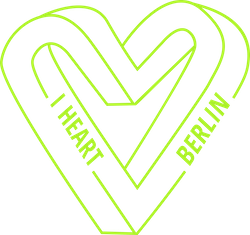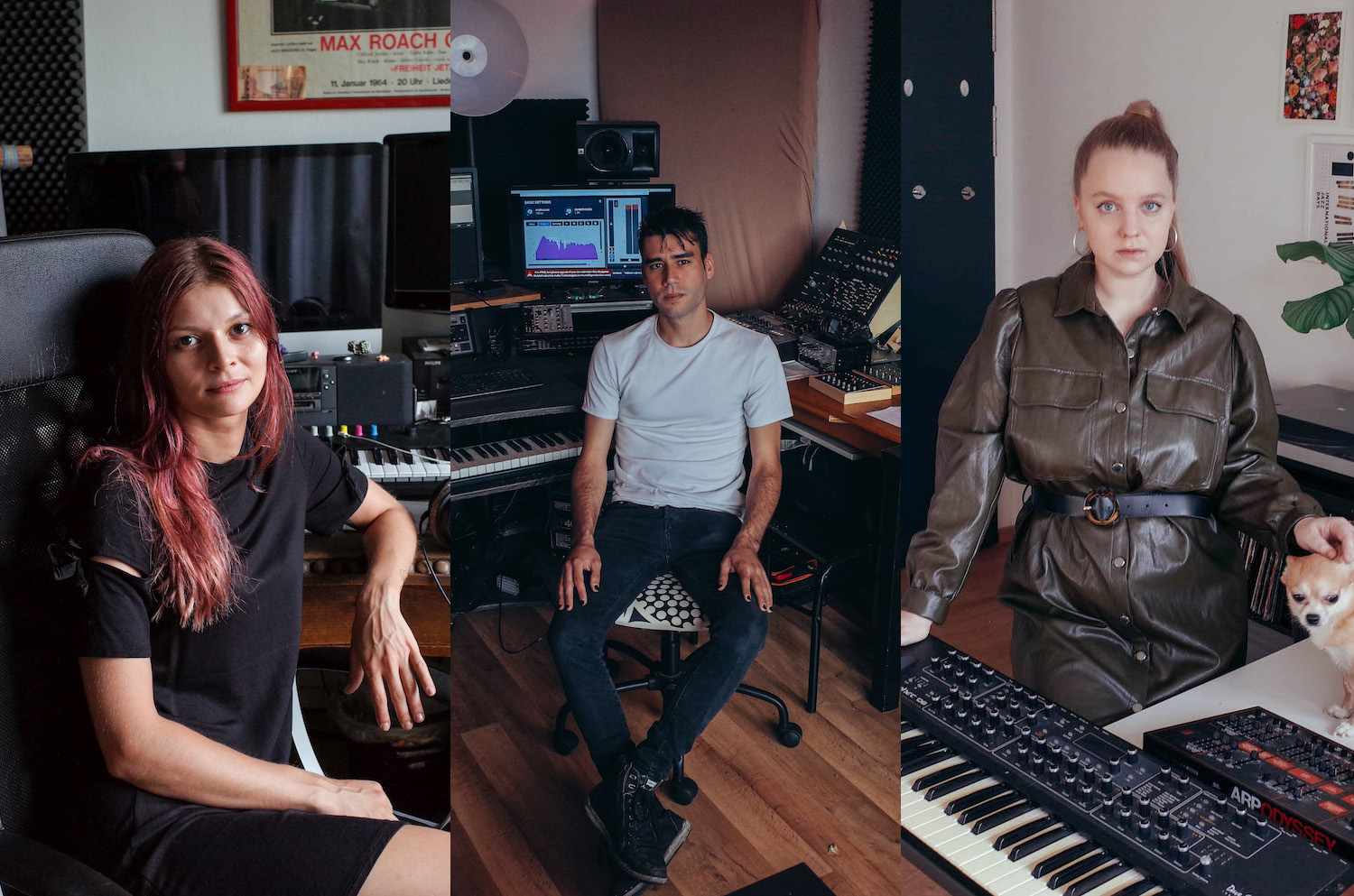Fotos: Kseniya Apresyan.
Berlins Nachtleben und Musikszene halten den Atem an. Und das nun schon seit fast einem Jahr. Was normalerweise der Hauptgrund für Menschen ist, aus der ganzen Welt nach Berlin zu kommen, befindet sich nun in einem seltsamen Schwebezustand, den die Stadt noch nie gesehen hat. Clubs und Bars sind geschlossen – oder bestenfalls zu Covid-Testcentern umfunktioniert – die Bühnen sind leer und all die Menschen, die normalerweise an diese Orte kommen, um zu tanzen und zu feiern, sind höchstwahrscheinlich zu Hause – hoffentlich nicht allein.
Es sind ungewohnte Zeiten, wir müssen so vieles komplett neu überdenken. Doch während die Partykids und Konzertbesucher einfach andere Wege finden werden, ihre Zeit zu verbringen, sieht es für die Menschen hinter den Kulissen und an den DJ-Decks und Bühnen des Berliner Nachtlebens ganz anders aus. Sie alle stehen vor einer ungewissen Zukunft, viele sind arbeitslos oder müssen ganz andere Berufe ergreifen, um ihren Lebensunterhalt zu verdienen, einige mussten sogar die Stadt verlassen und in ihre Heimatländer zurückkehren. Es ist eine Tragödie, wenn man bedenkt, dass diejenigen, die den Ruf Berlins aufgebaut haben, eine der blühendsten und einflussreichsten Nachtleben- und Musikszenen zu haben, während dieser Pandemie praktisch mit nichts dastehen.
Die Dokumentarfotografin Kseniya Apresyan, die uns bereits im letzten Jahr mit ihrer Tag/Nachtleben-Outfit-Serie beglückte, hat den Berliner Nachtleben-Machern und Musikern viel Aufmerksamkeit geschenkt. Für ihre neue Serie hat sie 11 Personen, darunter Veranstalter*innen, DJs, Clubmanager und Musiker*innen, interviewt und fotografiert, die ihre Gedanken zur aktuellen Situation und zu ihrem Leben während der Pandemie teilen.
Mit der Serie wirft sie die Frage auf: “Werden wir in Zukunft noch Clubs haben und wie werden sie aussehen?”
Da eine Wiedereröffnung von Clubs derzeit nicht in Sicht ist, ist diese Frage schwer zu beantworten. Wir können nur hoffen, dass das Nachtleben zurückkehren wird, aber wir können uns schon ziemlich sicher sein, dass es ein anderes sein wird als das, das wir gewohnt sind.
1
Diana May
DJ and Tutor
I was a full-time self-employed DJ, playing 2-4 times a week and touring a lot. In February
no one was afraid that they would shut down the clubs, it seemed so unreal. But it happened.
I lost lots of money: I had train tickets, plane tickets, everything.
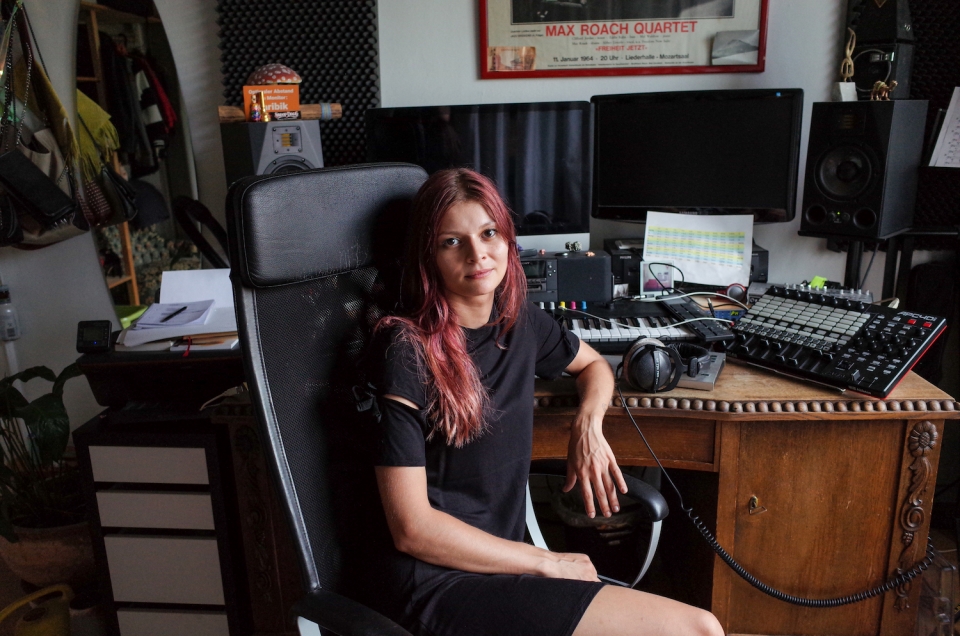
Everyone was in a panic. There are so many people in the industry: security, bartenders, bookers, make up artists, videographers, even people who make posters for the parties – they just lost their jobs.
Now I work as a partner acquisition manager. It’s hard for me to be employed and have the same routine every day. Sometimes I wake up, work till 6 pm and then work on my music. The home office is literally killing me because of the back pain, as a DJ I’m so used to moving all the time.
I’ve put my heart and soul into my job and it’s so depressing that everything is closed. My last gig was in March and since then I only had live streams: but to be honest it’s horrible to be in the club alone.
2
Bruno Otranto
DJ and producer
I’ve been DJing for 20 years, mostly playing in Sisyphos, Golden Gate, and Kitkat.
Luckily enough I started my own DJ school 2 years ago.
When Corona started, I didn’t have any gigs left but continued to teach. Although my students are asking me when they can play in a real club, and I don’t have an answer. I haven’t played myself since February 2020.
Parties are not allowed, because politicians have the wrong concept of clubbing in their minds: that people just go to parties for sex and will never keep the distance.
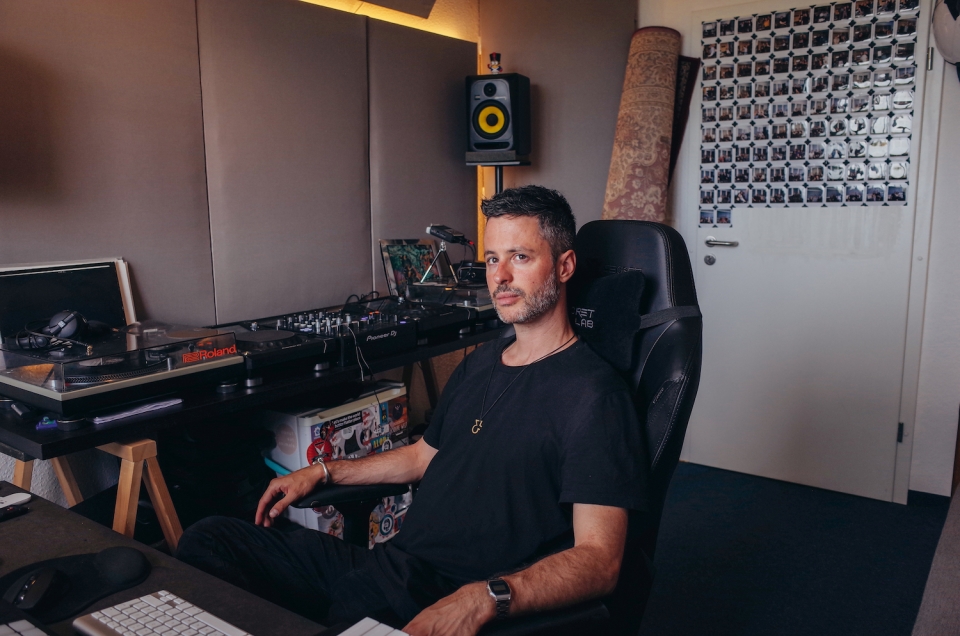
Techno scene has always been very respectful and followed the rules (for example not taking photos inside the club). I think people will have to adjust. Masks, distance, maybe special air purifiers in the clubs. I don’t think that situation with the virus will change soon.
It will also definitely affect the scene, but in a good way: people will stop to book superstar DJs and turn to the local ones. The underground scene will develop and I can’t wait for it to happen. At the same time, it will be probably very hard to be booked: clubs won’t be open for the whole weekend and people have been waiting to play for such a long time.
3
Randy Quan
DJ, photographer, and filmmaker
I used to be a social media manager for DJs for 9 years. When corona started, I’ve already quitted that job and was working on a web series for another musician.
We still did not release it: now DJ’s are not worth anything.
I’ve been DJing myself for 15 years and was a resident DJ in London. It was a side passion.
I didn’t have much time for my own gigs and was playing maybe once a year. In 2020 I planned to focus on my own career.
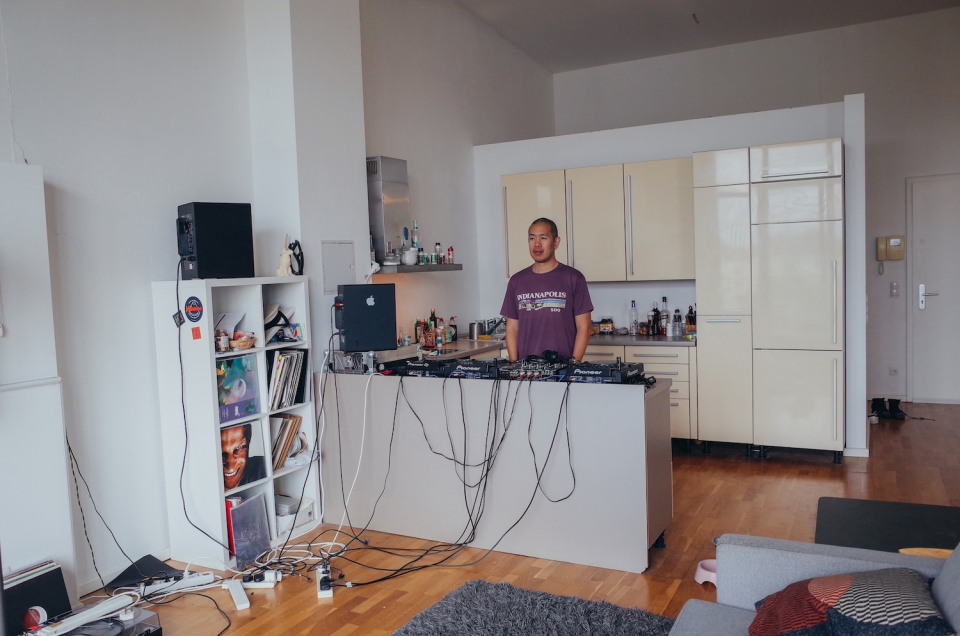
During the quarantine, I was really sad and didn’t know what to do. It was like a mourning period. Either you’re in lockdown and you feel like shit or you go to private parties and still feel like shit, but at least you’re having fun.
I’m the type of person that is working towards a goal. There’s always an objective. And now for a few months, there was nothing. It was like.. being in jail? So boring. Once the goal is taken away, you’re like: what the hell am I doing?! I was really sad.
Since July I’ve been working part-time at a computer repair shop. The owner trained me from zero. It’s pretty stressful because laptops are so fragile. I was thinking about working in a call center if I have to. No matter what, having a regular job is a luxury right now.
Who knows when the industry is going to return. Now all the DJs are roughly equal: the big ones and the small ones. So whoever can survive Corona might be able to return and play by the time clubs will be potentially open again. And I’m gonna try to get back in.
4
Schlindwein
Composer, producer, pianist
I’ve been working in the music industry for 8 years. In Berlin, I played in places like Klunker-Kranich, Holzmarkt, Kantine am Berghain, and Lido. I’ve played piano in some bands, had a couple of gigs every month, went to small tours in Germany, Vienna, Belgium.
The main income for most people is from live shows. Now there’s no way, except if you are really big, to get paid. If you were in a local scene with spontaneous events (without your own team and booker) – all of that is really gone.
Most people are still very worried. Now it’s more than 6 months (the interview took place in October 2020). You don’t know when you can go back to your artist job. Everyone is affected, not just musicians: security people, bar employees, technicians, that are taking care of the light and sound – they are all out of work. It’s a perspective that’s missing right now. I think it’s the heaviest part. Not that they can’t do what they love right now, but that they don’t know when they will be able to do it again.
During the lockdown, I did a lot of recordings. Lately, I’ve put out an EP and have another full album that will come out in 2021. I’ve used the time to write a lot of music.
There is an ad campaign in the UK now where the government is telling people:
Rethink Reboot Reskill... something like that.
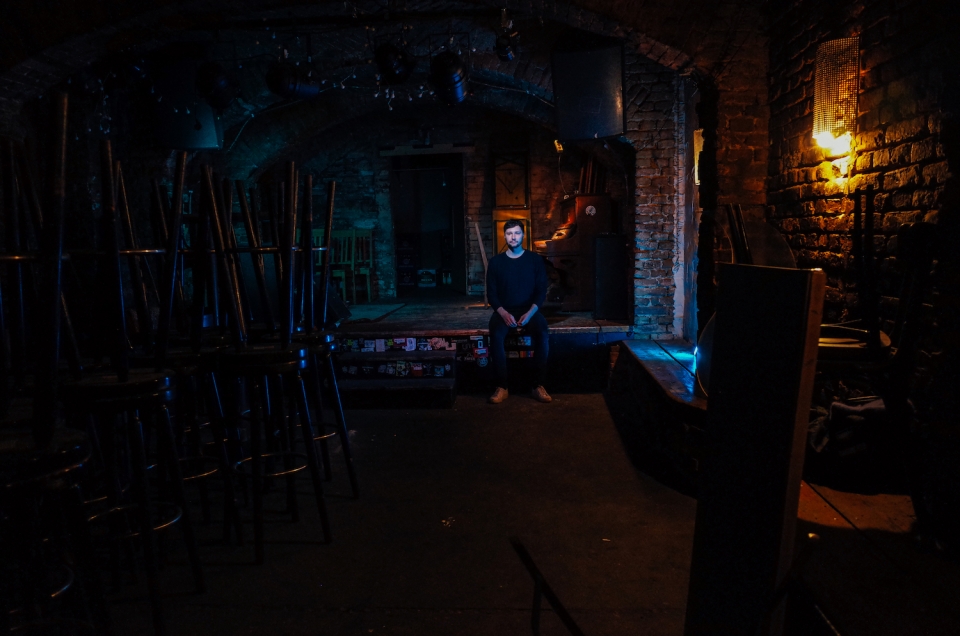
They’re pushing artists to change their job. For example, there’s a ballerina on the poster and it’s written that her next job can be in cyber. I saw similar posters about changing a job from educational courses in Berlin. Not very encouraging.
The situation now has an emotional impact on everyone… Especially in a city like Berlin, where most of the people move because of the music and the creative scene.
For me, it’s not just about the gig itself and the money, but the energy you take out from the dreams that you have. A lot of the motivation in the creative work comes from goals. If you’re thinking right now “Oh, my dream was always to play at Burning Man”, then your dream is just canceled right now. It’s very, very sad. Takes away a lot of the energy. Even if you’re still in a good place financially.
Since I have 8 years of experience in the industry, it helped me to find a job. From September 2020 I’ve been working in music licensing. It’s an office job. It’s interesting, but of course, I have less time to do my own music. That’s why I’m glad that I invested time during the lockdown and have a release plan now.
I’ve heard about an interesting concept from one club in Vienna: people get tested at the entry. When they’re inside, there will be a very low probability someone is ill. Also, there is a special ventilation technique that sucks out the air, disinfects it, and puts it back. Then it will be really safe, even if you don’t wear masks inside. So the concept was really nice, now the government has to agree, then they test it for 8 weeks and see if it’s really working.
5
Soela
DJ and producer
I was working as a DJ, musician, remixer, sound engineer, and music teacher. When the quarantine started, I was staying at home without any work. Literally. My school work was on pause, all my gigs were canceled in just one moment, all the events I should have worked at were canceled too. I was feeling unsafe, nervous, and very depressed. I was crying every day because I was not able to fix this situation. Even though I was making some steps to find some work and different activities, and tried to become a volunteer to buy food for some elderly people. When I was checking my savings and money that I earned this year, I figured out that I had almost zero in March, April, and May 2020.
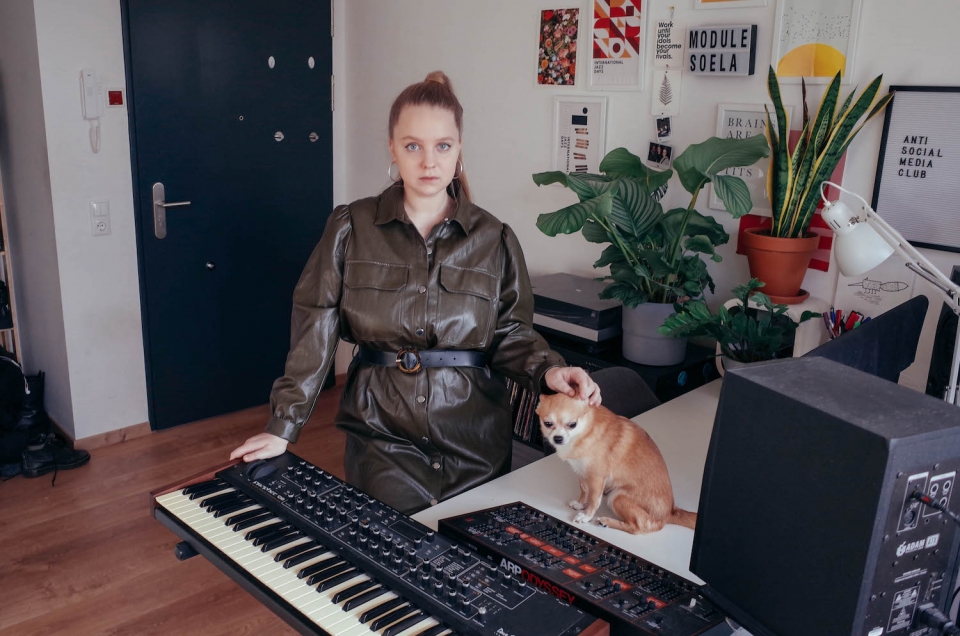
I don’t see any logic in Tanzverbot and the rule that you have to be in a mask while you’re standing, but if you’re sitting at the table (in a bar, for example) you can remove the mask. Or the virus is spreading only if you are standing? I also think that there are some more hazardous activities and situations than just dancing at open-air parties. Don’t we have more chances to get the virus in the U-Bahn, where a lot of people are not wearing masks?
I don’t know if I see my future in the music industry, as now I know how fragile it is.
Possibly, I will try to find something more predictable and stable.
6
Viktor Kiktenko (Module One)
DJ, producer
I have been in the music industry since 2013. As soon as the lockdown was announced me and my girlfriend were in Budapest. We realized that we need to get back to Berlin as soon as possible.
When we got back it started to get more and more serious and approximately in a week of time we lost all the DJ gigs and freelance projects. At first, it caused a sense of despair and serious financial losses. The only activity at that time was cycling in the city outskirts to calm down and at least have some physical activity.
After the easing of the lockdown, things got much better and we finally could get a bit of socialization and some smaller work projects. And yeah… The streamings! We did tons of them as it was the thing.
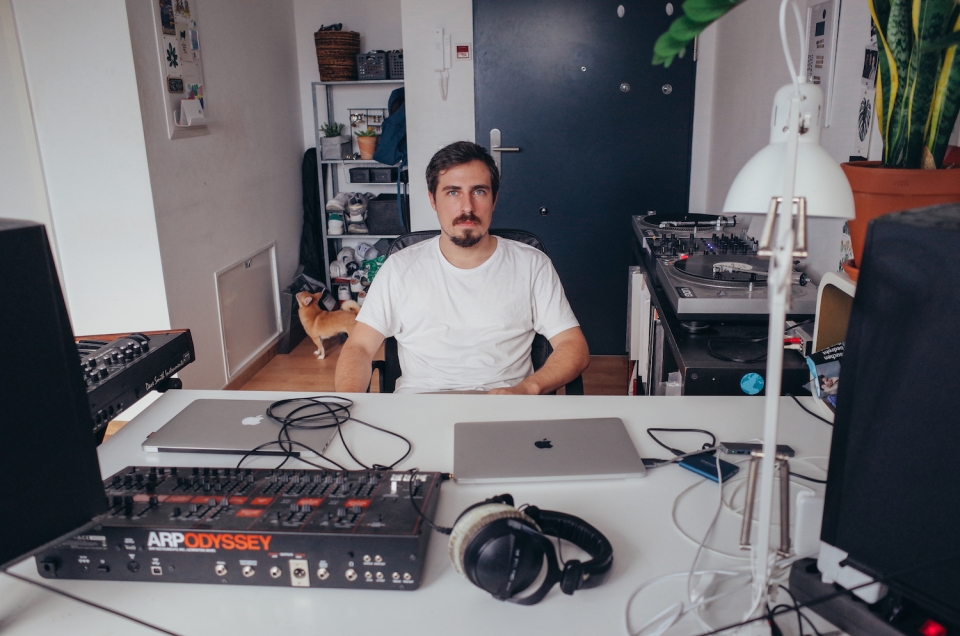
I participated in one legal event here in Berlin, but only as a visitor. My girlfriend was playing at the OXI Garten. It was great to see that people behave responsibly and wear masks, though it still felt strange.
The entrance fees get higher and higher, so enjoying a party with lots of limitations now could be quite costly. I just prefer to stay home as I know I’ll pay a lot of cash for the experience that I might not enjoy. Last parties before the lockdown proved how fast the virus spreads indoors during such events. I can hardly see any solution for the upcoming winter season (2021) where there might be no opportunity for even a single legal party.
7
Raul Alvarez
sound engineer and music producer
I was a manager of MONOM space in Funkhaus. I was working with other artists, also made
a couple of installations myself. In January 2020 I’ve decided to change my life:
to do installations, showcase my label and live performances. Nothing of this happened.
It was the worst year to do it. In September in MONOM it was allowed to sell only
36 tickets instead of 400 and I worked only 6-10 hours a month.
First weeks of quarantine I literally didn’t leave my studio and made one track per day.
So I have 5 albums ready now. I was releasing them in Bandcamp every day. When everything opened partly in June 2020, I decided to remove the tracks. Now I plan to release them in the next few months.
In July and August, I started to make open-airs and raves, teaming with people from different clubs. We wanted to do a party with proper sound, not like in Hasenheide: big crowds with only a shitty speaker. We’ve rented a warehouse in Lichtenberg for one week and turned it into a club. Using palettes, four towers of Function One, strobes, LEDs, and so on. We’ve built everything ourselves and made a 12 hours event for 200 people (within a limit for private events at that time).
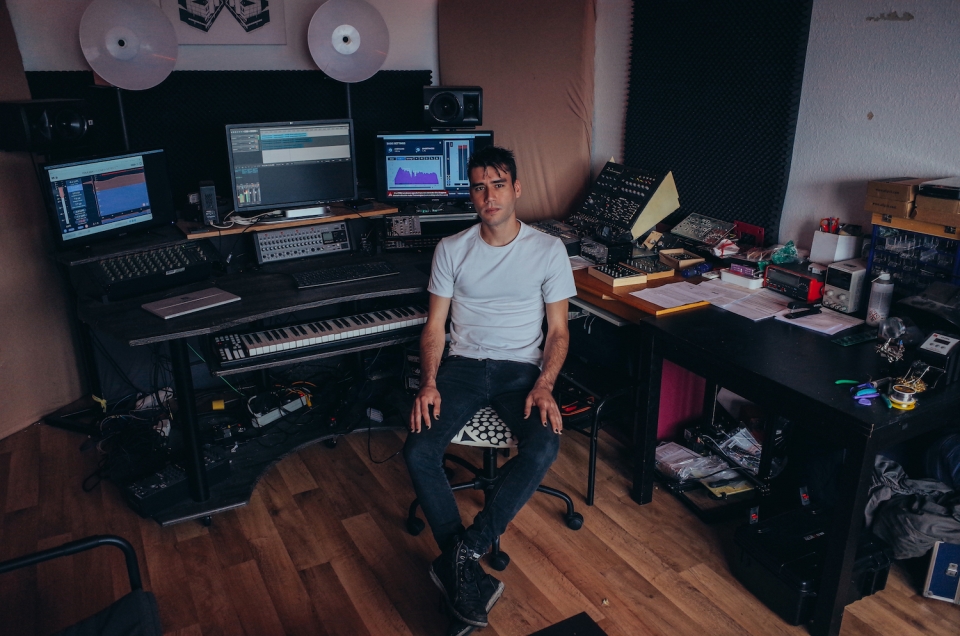
It was not illegal, because we had a rental contract. We had sanitizers, masks, and everything. When the police came, they said that we were following the rules better than most other “official” places. We had to rent all the equipment, organize drinks and so on.. and in the end, have spent 4 times more money compared to the normal events. But it’s worth doing it for the love and passion of doing it.
I don’t want to change my job. If I do it, I would not come back. If I start working in a restaurant,
I can make much more money than now. But if you are employed full time, you don’t have any time and energy left for the music. That’s why now I’m just waiting. I’m planning to do anything I can on my own, either it’s a private party or installing proper sound to the public one. If I can get more studio work, I will do that.
Big DJs can live 5 years without working and they will be fine. And they are waiting. Because all of this will clean the industry: underground communities, clubs, labels, and artists.
All of the big artists should be now pushing the underground. Instead of streaming from their own houses, big DJs could make an online festival with underground people from their labels. And maybe pay them for streaming! But nobody does that. A lot of artists don’t care about the music itself, just as a commercial product.
The only companies that grow during corona times are the big corporations like Amazon and Netflix. And the same will happen to the music industry.
8
Filip Abramczyk (Pysh)
DJ, Music producer, sound designer, and Teacher
I’ve been a DJ since I’m 16, for more than fifteen years. Since 2009 I’m living from this. I moved to Berlin in 2019 and was planning to build my career. Before Corona, I was working in my Berlin studio on weekdays and playing in Poland on weekends. I was trying to build connections and I should have had my first gig in Kater Blau in May. And then the lockdown came.
Imagine that you are a DJ for more than ten years. And the longest period without a gig was.. maybe three weeks? Then you need to spend 4-5 months without clubs. It was hard. I’m glad that they opened clubs in Poland in May 2020, so I could play there. But now (in October) there’s also a lockdown in Poland.
I have planned to launch my own label, few gigs in Colombia and Russia, and a lot of other projects. I have goosebumps even now when I think about it. In the end, we needed to postpone it.
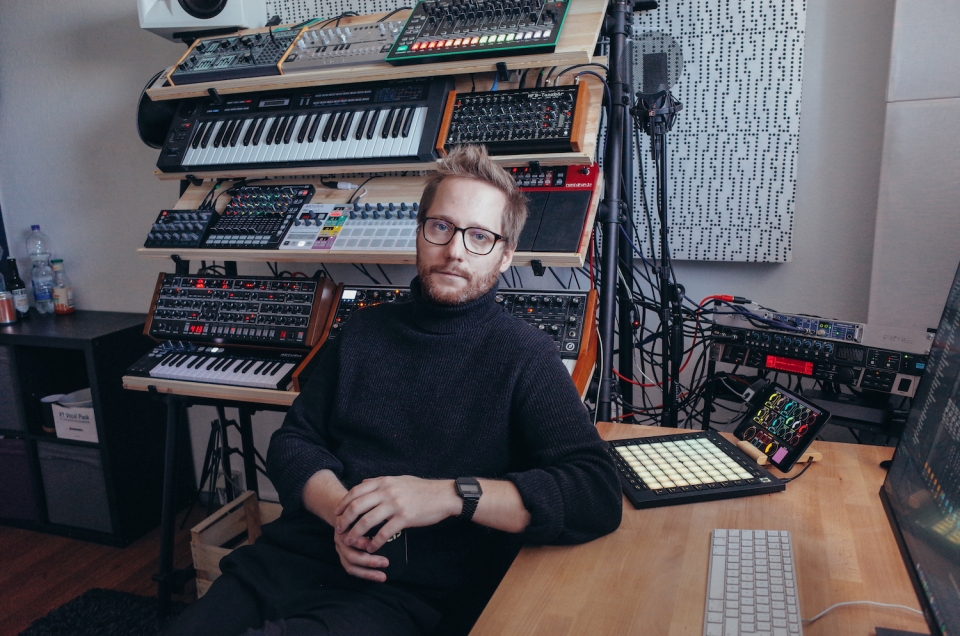
Lockdown gave me the chance to experiment with my sound and learn new things: I didn’t feel the pressure of producing and releasing every month. There’s no sense to do club music right now because nobody will play it. But for me, making music is my life, my passion. I just don’t give up.
What I also see as positive is that clubs can be a way to escape from real life. Lots of my friends were partying all the time and had problems with their private lives, drugs, alcohol. Now life will change for them. It’s also cool for me, I need to think about how to spend every weekend, which I didn’t do before. There are so many options: working in the studio, maybe I’ll buy a bike, spend more time in parks, do bbq in spring, or will just devote one day to myself and relax.
Maybe the future is virtual clubs and virtual connections? Maybe it’s a black mirror scenario? Everyone will sit at home with VR things on their heads, drinking. I saw the video with a virtual club simulation: DJ puts on sensors that track his movement and all the dancers are just avatars. Like in a game, like playing GTA. It’s a cool idea, but to be honest I don’t like it. I want to meet people, to feel, not to visualize what I am feeling. It’s making you feel more lonely.
9
Hilly Leader
event organizer
Before Corona I was an event manager, doing BDSM parties for 3 years and it was working really well. I had a very successful party in February with 400 participants. And then Corona shut everything down. It was a big shock. It went from working a lot and being with people all the time to nothing… in just one day. It took me some time to understand what was going on. I live alone, so the lockdown was pretty hard. I didn’t work for about 3 months.
People look at parties as something to just have fun and not to care about anything, but parties are more than that. Of course, dancing is very important. But there’s also a social part of it. A lot of people don’t have anywhere else to socialize. People can still dance at outside events (August 2020). But it’s also very hard to do that with restrictions. It’s unnatural not to give somebody you like a hug.
But it’s really important because otherwise, people will just lose their minds. I can already see it in myself: if I had to go into lockdown again, I don’t know what I’m gonna do. And I don’t know what’s worse: the actual virus or people losing their minds because of the isolation. It fucks you up mentally.
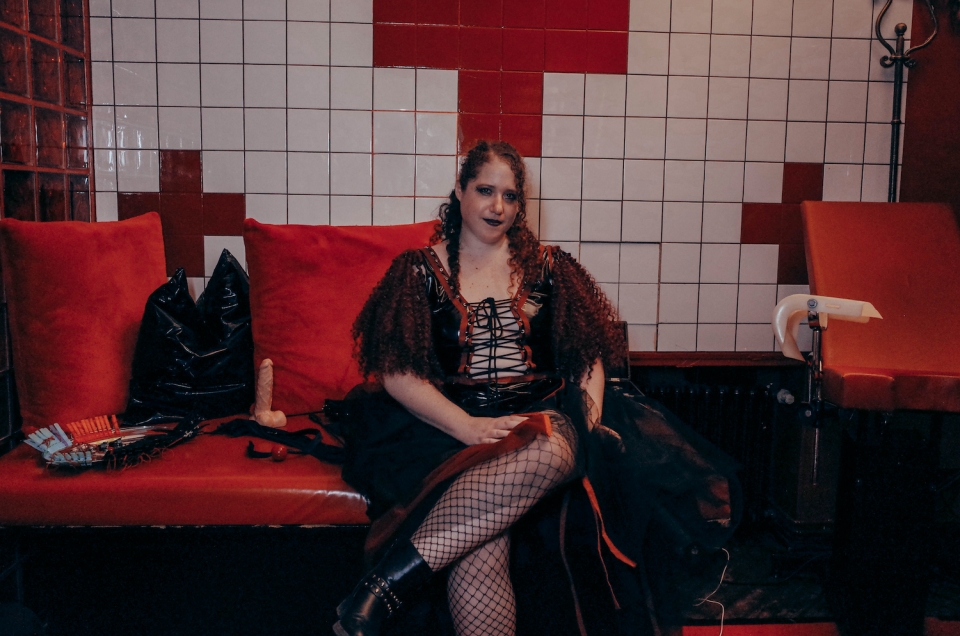
I don’t think the industry will have a problem with customers. I think the main problem will be what would be left. We’re working really hard to save the club (Insomnia). To make sure there will be a place to come back to. A club is like an ecosystem. Many people are depending on it, besides the people actually working inside the club. If a club is gone, where are they gonna work?
Everyone still has to pay the rent. Smaller venues got shut down. And it’s all a matter of time… How long you can survive. In the beginning, when everything started, people were donating a lot. But at some point, it stopped. So it’s like a surviving game at the moment… How long you can survive. Which is pretty bad. Now we’re doing live streams to support the club financially. People work twice as hard as before and get paid less for that. Because there’s no money.
10
Florian
Club manager of Fiese Remise and Diskotheque Mélancolie 2
I was working for 7 years as an event manager. During the last years, I worked for Fiese Remise and Discotheque Mélancolie 2, working together with bookers and promoters. The last party we had… was on Thursday before the lockdown. The day after I was speaking to my boss and we decided to close the club before the Senate made us do it. Most of the clubs did it. Since then I’m on Kurzarbeit. I’m very happy we didn’t have to shut down, as other places did – our bosses are real fighters.
In June 2020 we did some live streams to make some content for social media and also a crowdfunding campaign, but it didn’t go really well. It was summer already and people were at the open-airs, so no one was watching any streams. It was too late. But at least we were occupied doing this.
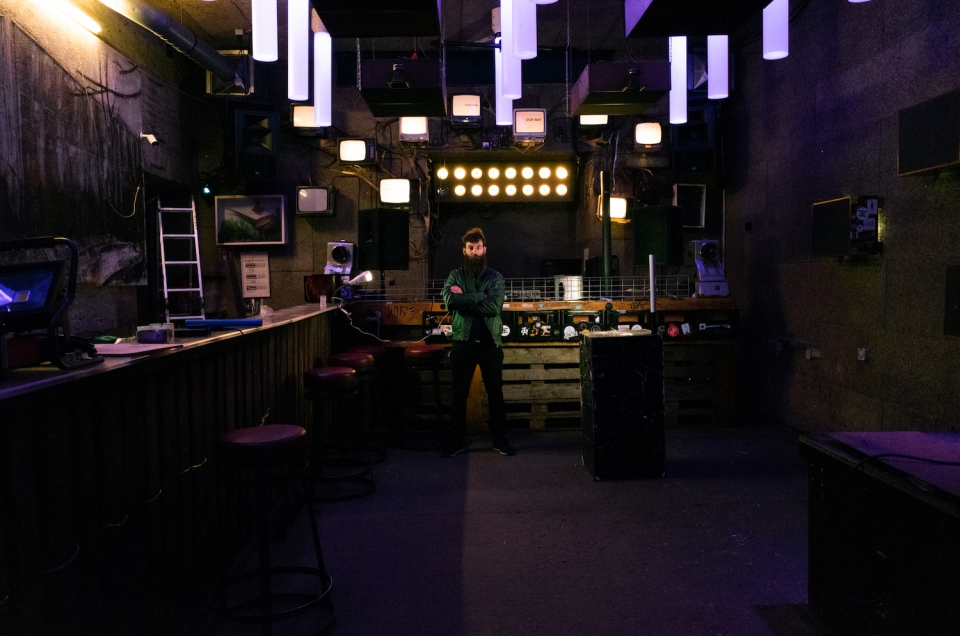
Between DM (Diskotheque Melancolie) and FR (Fiese Remise), we had a team of around 30 people, and now there are only two of us left. The others don’t have a job anymore, they were mostly mini-job people or freelancers. Some of them found other jobs, some – had to go to their home countries. It was a really tough time. And when the clubs will be open again, we almost have to start from zero and find a new team.
I will work only in DM now since FR is rented by a fashion brand till 2022. Maybe it’s even good because of the idea of re-opening two clubs at the same time… It’s a lot of work. So maybe we do it step by step.
11
Mia Zarring
DJ, sound producer, and TV host
I came to Germany in March with one hundred euros and a bunch of musical equipment.
I wanted to get to know the city, its people, and the music industry. I came, and all the clubs were closed. Covid broke all my plans. And I couldn’t fly back.
I’ve spent most of the quarantine in a small room with an electronic organ and all my equipment. There I’ve recorded a track, devoted to the state of a creative person who is locked in an apartment and is trying not to lose himself in isolation.
I’ve had asthma since I was six years old, so when corona started, I was really scared and tried not to leave the house. I’ve made my flatmate buy a mouth-nose and even eye- mask. I was in a panic and disinfected the whole flat every day. We’ve even had a serious talk with my parents, discussing what to do, if anyone dies. They asked me not to come to the funeral in this case, because airports are really dangerous for the people in the risk group.
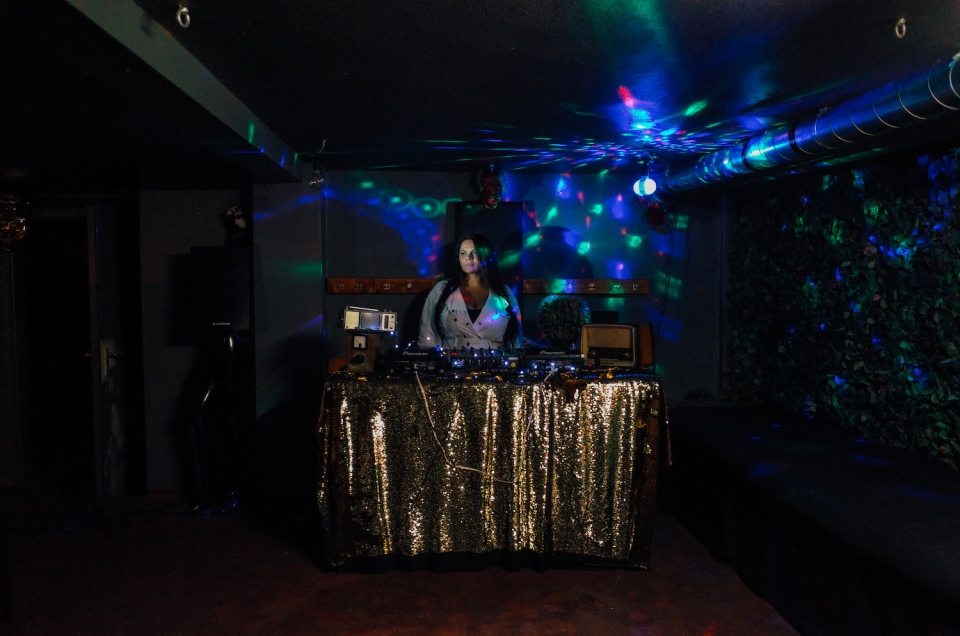
When I came to Berlin in May, I changed my attitude toward the virus. I got the chance to play at some parties and events. And when it came to the choice between fear and music.. I’ve chosen music. I’ve been scared for long months and understood that it’s not worth it. To be honest, I prefer to live a shorter, but happier life.
In summer 2020 I played a lot at the open airs and private events. Once I’ve had 7 gigs a week. But most of them are unpaid. I lived from donations from my friends from Europe and Russia, and my followers on social media.
(in September 2020 Mia had to fly back to Russia)
